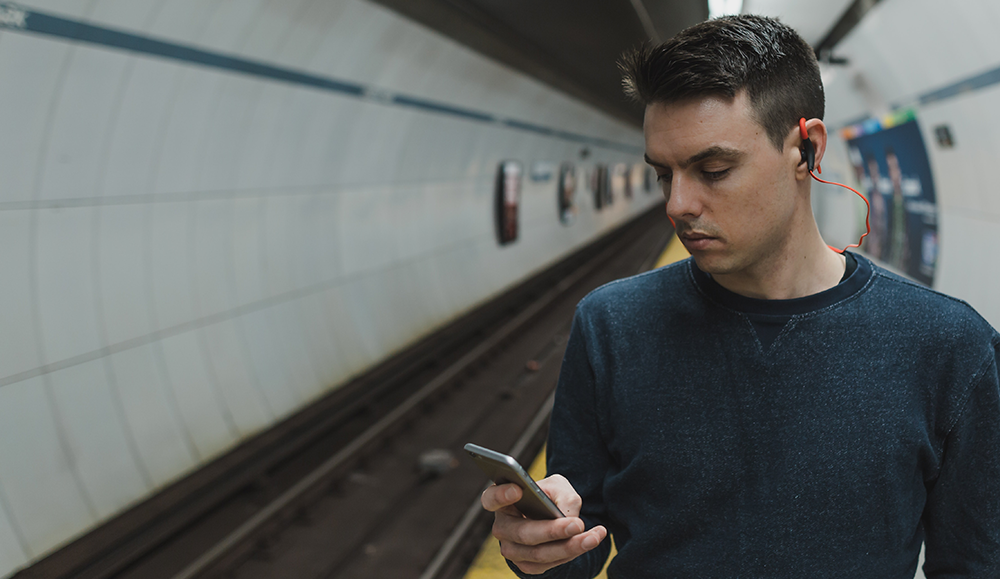Put Down Your Phone: 4 Brain-Building Activities You Can Do at the Bar

Article by Srini Pillay
The bar is crowded. You’ve ordered your favorite drink, and your friends have not arrived yet, so you grab your phone to scroll mindlessly through Instagram or send a few work emails while you wait.
This is far from a unique situation. In fact, Americans check their phones about 80 times a day. However, retweeting, liking, and texting instead of looking up from the glow of the screen can keep you from experiencing potentially profound moments that help you grow personally and professionally.
I recently realized I’m no different from the norm when it comes to spending time on my phone. Whenever I was early to a lunch or dinner meeting, I often chose to check my phone rather than appear idle. There was almost a relief in deleting useless emails to pass the time.
Then, out of the blue, I became cognizant of how insane this was. Why did I need to prove I had something to do while waiting? Why did I put myself through this addictive routine just to monitor the random updates of people I hardly know or care about on social media?
This behavioral tendency known as “hypernatural monitoring ” may be common, but it is far from natural. It’s all about alleviating angsty and anxiety-provoking anticipation through social reward and impulsivity. The “relief” of reaching for your cellphone can give the brain a dopamine surge, which is fine in general, but not when it starts to resemble an addiction. Constant mobile use does not soothe the brain. In fact, it inflicts torture and might even alter the brain’s white matter integrity, which can lead to depression and other disorders.
Overall, it appears excessive cellphone use is a form of self-sabotage, one we’d be wise to start correcting.
4 Brain-Building Strategies to Pass Time at the Bar
In an effort to check my phone less often, I began using the following four techniques instead. They have not always been comfortable, but after a little enforced practice, they have improved my life considerably.
1. People-Watch to Build Your Brain’s Social Network
Watching our mobile devices has replaced people-watching as an idle pastime, but it’s about time we bring people-watching back. Next time you find yourself waiting for someone or something, simply put your phone down and take a look around.
To understand people, our brains use their own “social networks.” When we people-watch, we activate these networks and teach our brains how to empathize better. Putting away your phone and taking time to train your internal social network will help you develop people skills that could improve your relationships with family members, friends, and coworkers.
2. Doodle on a Napkin to Strengthen Problem-Solving Skills
When you unfocus by doodling, your brain becomes more absorbent, sort of like a sponge. In fact, doodling can lead to a 29 percent improvement of memory, and it also triggers the brain network that puts puzzle pieces of information together to solve problems. So instead of scrolling through Facebook, try asking the bartender for a pen and a napkin.
3. Play Pretend to Enhance Empathy
Try out “psychological halloweenism” — the act of adopting the persona of someone you admire and behaving as that person would. It’s better (and more fun) if the person you are pretending to be is a creative.
Studies have shown that when you are behaving like an eccentric poet, for example, you are far more creative than when you are imitating a rigid librarian. Moreover, because this activity involves mentally walking in someone else’s shoes, it’ll train the part of your brain that allows you to empathize with others. Practice this exercise enough, and you may become better at participating, leading, and receiving feedback in workplace settings.
4. Focus on What Makes You Happy to Encourage Resilience
If it’s a dopamine surge you’re after, nostalgia will likely do the trick. In fact, nostalgia plays a role in psychological resilience, and when you remember good things, your brain feels rewarded. As you wistfully stare at the bar, take the rare opportunity to think about something or someone heartwarming from the past. Doing so will strengthen your brain and put you into a better mood.
—
Be warned: Excessive cellphone use can turn you into an anxious addict. However, if you try one of these replacement techniques while waiting at the bar — or wherever you find yourself — your social skills and creativity will likely improve. Additionally, you might even feel calmer and psychologically stronger, which will positively influence other aspects of your daily life as well.
A version of this article originally appeared on SUCCESS.com.
Srini Pillay, MD, is the CEO of NeuroBusiness Group and the award-winning author of numerous books, includingTinker Dabble Doodle Try: Unlock the Power of the Unfocused Mind ,Life Unlocked: 7 Revolutionary Lessons to Overcome Fear, andYour Brain and Business: The Neuroscience of Great Leaders. He also serves as a part-time assistant professor of psychiatry at Harvard Medical School and teaches in the Executive Education Program at Harvard Business School.

